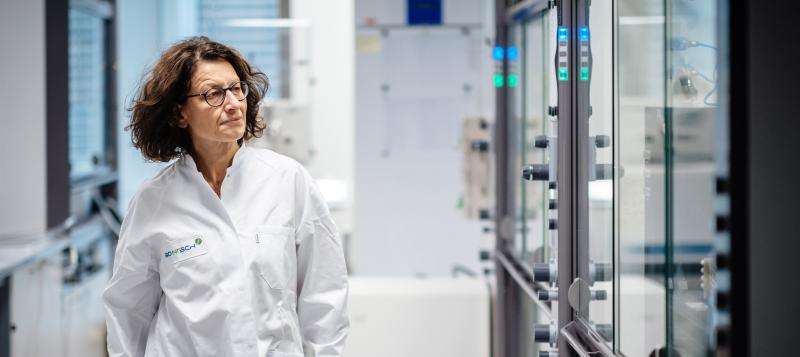The Pan-European Guarantee Fund bolsters small businesses hit by the COVID-19 crisis. Just as another guarantee finishes mobilising over €500 billion in investments
When the COVID-19 pandemic is overcome, our bodies will carry traces of the virus that we have survived. The same is true of our economy. And just as we all act together with solidarity to protect each other through social distancing, a great coordinated campaign with the participation of many EU nations is the best route to return us to prosperity.
The biggest part of the European Investment Bank Group’s pandemic response is the Pan-European Guarantee Fund (EGF), which aims to use up to €25 billion in guarantees provided by contributing EU Member States to spur as much as €200 billion in financing in the participating countries by the end of 2021. Most of that will support small and medium-sized enterprises, with some of it intended for slightly bigger companies and healthcare entities, and it will be provided through debt financing, as well as venture or growth capital.
The Guarantee Fund is a massive undertaking. But the EIB Group is confident that it can meet the challenge. We can point to the success of our previous crisis response, the European Fund for Strategic Investments (EFSI), a five-year guarantee programme that ran until the end of 2020 and far surpassed its target of €500 billion in investment supported. “The level of ambition for pushing the European economy higher is there,” says Wilhelm Molterer, EFSI’s Managing Director. “If you want to make a big impact, you have to create a big programme and go for it.”
The EGF certainly does that. And in double quick time, too. “It would normally take two years at least to prepare a mandate of this size, but we put it together in six months,” says Ioanna-Victoria Kyritsi, who leads EGF implementation at the European Investment Bank. “This is incredibly ambitious and new for the Bank. It’s a crisis instrument. We’re really trying to make a huge difference for affected parties in the Member States.”
One of the leads on the EGF at the European Investment Fund, Bernardo Ghilardi, concurs. “There are so many parties involved in a programme of this size and they all needed to be on the same page. It was a massive effort for the EIB Group.”
So how does the Pan-European Guarantee Fund work? It’s a little like the European Fund for Strategic Investments, in which a guarantee from the EU budget allowed the EIB to invest in companies that might otherwise have been too risky. In the case of the Guarantee Fund, the EIB takes even more risk.
With EFSI loans, the EIB Group provided unprecedented support to small businesses, sharing the risk of new financing with local partners throughout Europe. With the EGF, the EIB Group continues to work through local partners to reach target beneficiaries. It is able to bear the lion’s share of the risk of new lending to target beneficiaries, based on the guarantees provided by the participating Member States.
The EGF is like EFSI in using a public guarantee to mobilise a much larger amount of financing than can be done with public grants alone. However, it is also unlike EFSI, in that the same concept has been adapted to address an urgent crisis.
“The EGF is about providing liquidity in a crisis,” says Marcus Schluechter, advisor to EFSI’s Managing Director. “It’s about fundamentally viable entities affected by the economic fallout from the health crisis being able to pay their bills and surviving the current turmoil, so they can rebound when the situation stabilises. The focus of the initiative is also much more clearly aimed at supporting small and medium-sized businesses.”
Guarantee fund bolsters small businesses during COVID-19 crisis
As the pandemic spread in the spring, small businesses across Europe were shuttered by lockdowns. The Guarantee Fund aims primarily at helping them, with at least 65% of its investment earmarked to support small and medium-sized businesses (SMEs). The EIB Group also launched a range of emergency programmes:
- €10 billion of additional working capital through liquidity lines to banks;
- €10 billion of loans to SMEs through asset-backed securities purchasing programmes;
- €8 billion of financing through guarantee schemes for immediate deployment;
- €6.7 billion of financing for projects related to COVID-19 outside the EU;
- €6 billion of financing for investments in healthcare infrastructure and the development of vaccines and drugs.
All EU Member States were invited to contribute to the Guarantee Fund with a share of the up to €25 billion guarantee based on their share of EIB capital. The Fund will enter into operations with the aim of keeping the net expected loss on the guarantee commitments at 20%.
“It’s all about wide outreach to support SMEs across all sectors,” says Piotr Stolowski, who leads EGF implementation at the EIF.
Guarantee legacy from EFSI
The EGF is one of a number of programmes developed in response to COVID-19 when the European Commission joined forces with EU Member States and European institutions to ready a swift and massive relief package for businesses devastated by the pandemic. Meanwhile, EFSI was already at work, immediately delivering hundreds of millions of euros in financing for projects to fight the pandemic.
With EFSI backing, the EIB financed a €50 million deal in May to fund the COVID-19 trials run by German-Israeli company Pluristem for its treatment using placenta cells to fight infections. In June, the Bank used the EFSI guarantee to provide Germany’s BioNTech with €100 million in financing for its COVID-19 vaccine programme.

BioNTech’s chief scientist Özlem Türeci is working on a COVID-19 vaccine, with backing from the EIB and the EFSI guarantee
Originally intended to counter the low investment environment that followed the financial crisis a decade ago, EFSI developed into a flexible tool for fighting a shock like COVID-19 or a broader crisis like climate change.
Its success is built around the concept that, rather than using public money for grants, a market approach can draw private investment into a project alongside the EIB and thus multiplies the impact of the original public guarantee many times over.
“EFSI shows what can be achieved with scarce financing when public and private forces are combined,” says Wilhelm Molterer. “This experience is becoming even more important, given the huge challenges ahead of us.”
EFSI beat its targets
EFSI exceeded its stated target of supporting €500 billion in investment six months ahead of schedule, even as it adapted to the impact of COVID-19 on Europe’s economy.
“I was excited to see how fast we managed to adapt our strategy and respond to the COVID-19 crisis,” says Iliyana Tsanova, EFSI’s Deputy Managing Director.
“We were able to quickly provide urgently needed liquidity to support companies impacted by the pandemic as well as funding for companies working on the development of cures and vaccines. Flexibility is the key to success.”
At a time when budgets are tight and public financing must make every euro go further, EFSI’s structure—and its success—has been remarkable. Its record “will prove useful in the time ahead,” says Molterer.
Guarantee fund bolsters small business through ‘time ahead’
Before the COVID-19 crisis, Molterer might have expected that the “time ahead” would mainly include the investment components of the European Commission’s European Green Deal and InvestEU, the investment programme planned in part as the successor to EFSI. Unexpectedly, EFSI had to show it could cope with the devastating blow to Europe’s economy delivered by COVID-19.
EFSI’s immediate response to COVID-19 illustrates the careful thought that went into its original structure and governance, and how finely tuned its operations have become. Some of those best placed to observe these workings sit on EFSI’s independent Investment Committee, which ensures that the European Investment Bank deals proposed for backing by the EFSI guarantee meet the criteria defined in the programme’s regulations.
One member of the Investment Committee, Gordon Bajnai, a former prime minister of Hungary who heads global infrastructure at investment adviser Campbell Lutyens, describes a crisis such as COVID-19 as “like a tsunami. If you survive the first wave, you have a chance to rebuild. If the systems of industrial production are broken and collapse, it can take decades to rebuild—or they might be rebuilt somewhere else, not in Europe.”
Bajnai, who led Hungary during the financial crisis, says that, “in a crisis, money that is given fast is worth three times as much as money given later on.”
That makes EFSI’s swift response to the pandemic key—and makes the swift foundation of the Pan-European Guarantee Fund vital to the year ahead.
